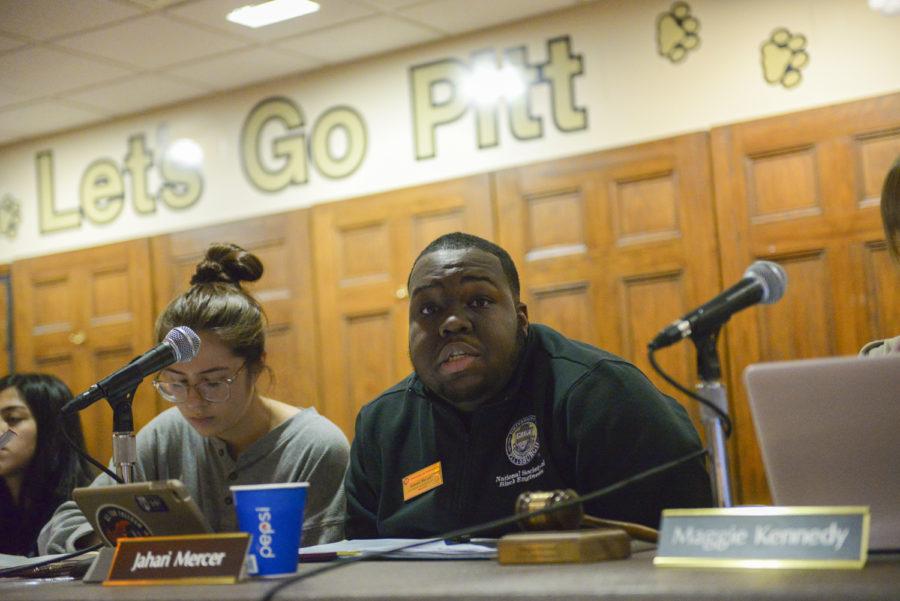SGB talks race, housing, sexual health
Hannah Heisler | Staff Photographer
During his remarks, Executive Vice President Jahari Mercer held a moment of silence for Trayvon Martin, who would have been 24 today.
February 6, 2019
In light of Black History Month, Student Government Board Executive Vice President Jahari Mercer offered a moment of silence for the 2012 death of Trayvon Martin during his report at the Board’s weekly Tuesday meeting, the day Martin would’ve turned 24 years old.
George Zimmerman shot and killed the unarmed teenager in Florida on Feb. 26, 2012. Mercer said, as a black young adult, the death of a black youth resonates with him.
“As a 21-year-old right now, to think about having your life cut short at the age of 17 really sticks with me,” Mercer said. “In order to honor his life, I wanted to make sure we took the time to remind everyone that black lives do matter.”
After this moment of solidarity, Board Member Albert Tanjaya announced the University’s $8 million plan to renovate the restrooms in Litchfield Tower A. Tanjaya said these renovations aim to provide better access for students with disabilities and reduce water output by 50 percent.
Tanjaya also said the University has signed another $8 million dollars in housing for a three-year lease for The Bridge on Forbes apartments. He said students have approached him with concerns about the University’s lack of housing and increasing student population.
“One of the goals for The Bridge on Forbes is to alleviate that need for student housing,” Tanjaya said.
Tanjaya said the University leased 87 apartments for about 230 residents. Though not confirmed, he said the pricing for The Bridge on Forbes apartments will likely compare to Bouquet Gardens.
The Board also announced the upcoming Sexual Health Awareness Week, which will be Feb. 6-14. Wellness Committee Chair Eric Macadangdang said the week will include a resource fair with student and community groups like Planned Parenthood of Western Pennsylvania, the Allegheny County Health Department and Students Engaging in Conversations about Consent and Sexuality.
Macadangdang said the Wellness Committee will host tabling events to distribute male and female condoms, as well as tips for encouraging sex positivity. Sex positivity is the idea that all consensual, healthy sex can be positive.
He also said the week will feature a roundtable discussion with a nurse from UPMC, a professor from the gender, sexuality and women’s studies department and the assistant director of Student Health Service. Macadangdang said these events can informally introduce many first-year students to the resources they have, easing the transition from high school to college.
“Health education in public schools is iffy,” Macadangdang said. “I think colleges can provide a good, stable resource.”
Board members also discussed the ways first-year students have become involved in SGB.
Vice President and Chief of Cabinet Jessa Chong said First Year Council students are currently making food waste graphics to put in the napkin dispensers at Market Central. Chong said the students want to bring awareness to how food waste can harm the environment with these graphics.
Chong said the FYC students also plan to make posters advocating for sustainability and against food waste. She said the council has met with students from the Student Office of Sustainability to discuss avenues for composting on campus, specifically in the dining halls.
But for now, SGB’s dining hall focus is improving the cultural menu items. Board members Zechariah Brown and Albert Tanjaya facilitated the 2019 Eat and Greet with the board. Brown said the event is a partnership between SGB and the campus dining services that lets students taste new menu items and try different options on campus.
Brown said he focused on the University’s accuracy when producing cultural food, noting that past recipes didn’t include proper ingredients. He also said he wants the food in the dining halls to better represent the various communities from which it originates.
“We went with a dish like curry chicken to represent Caribbeans,” Brown said in reference to one of his proposed dishes. “Because, as a Caribbean, I know that it’s a staple in a lot of different islands — it’s a broader dish.”
Brown said Sodexo has allowed student input for not only dish suggestion but also for the recipes themselves. He said this input from ethnic groups across campus helps make the menu as culturally competent as possible.
According to Brown, students of different ethnicities and cultural backgrounds feel left out of food culture at Pitt. He said he hopes this program mitigates this exclusion.
“Food is such a central part of your cultural identity that I believe we should always treat different people’s cultures and foods with respect,” Brown said.
Allocations
The Vietnamese Student Association requested $1,638.07 for a conference. The board approved $1,383.07 and denied $255.
Students for Sensible Drug Policy requested $2,442.84 for a conference. The board approved $1,185.95 and denied $1,256.89.
The American Society of Mechanical Engineers requested $1,946.40 for a conference. The board approved $1,493 and denied $453.40.
Model United Nations requested $1,756.92 for a conference. The board approved $1,687.44 and denied $69.48.
The Men’s Ultimate Frisbee Club requested $1,262.22 for a competition. The board approved in full.








